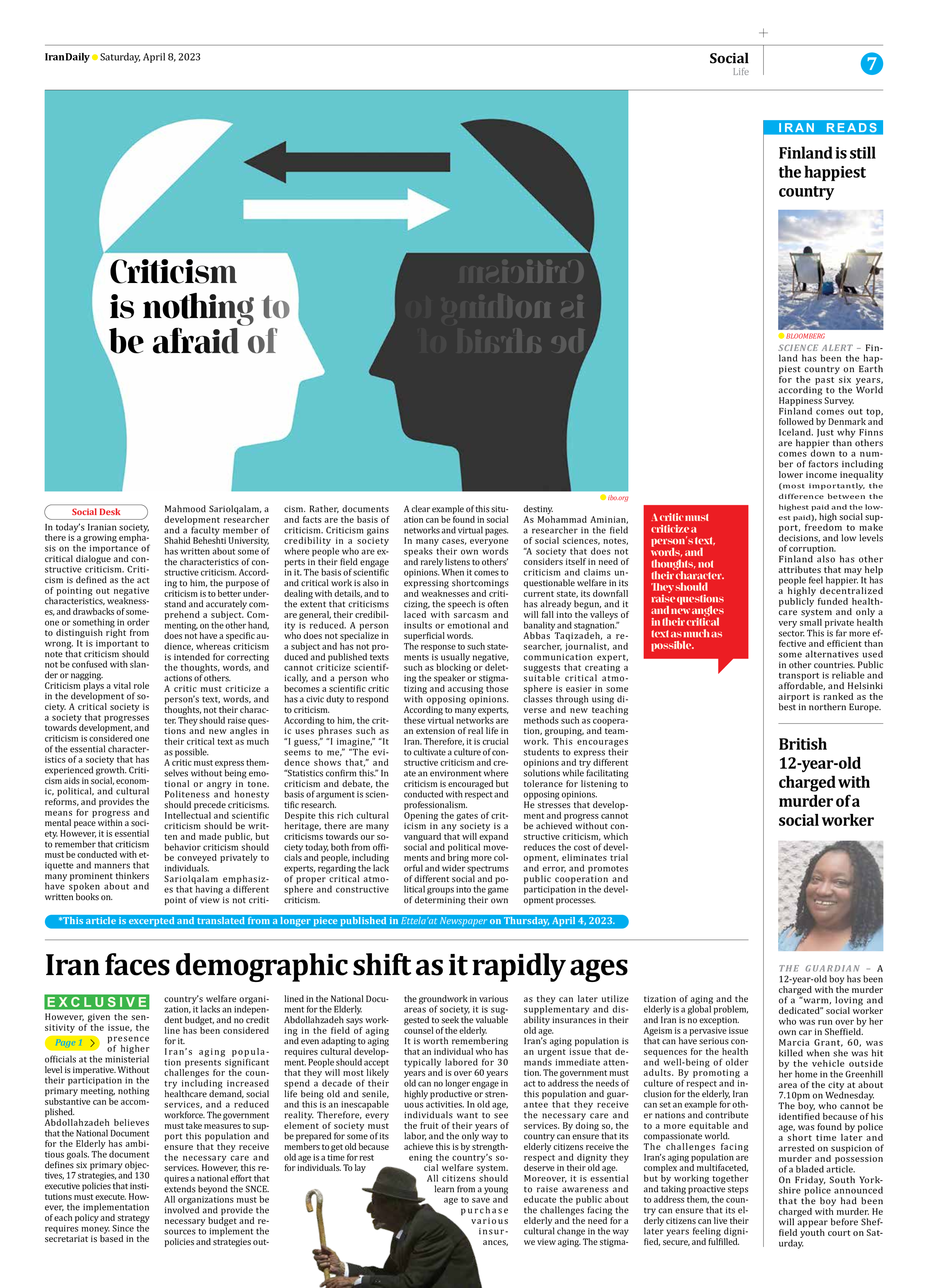
Criticism is nothing to be afraid of
In today’s Iranian society, there is a growing emphasis on the importance of critical dialogue and constructive criticism. Criticism is defined as the act of pointing out negative characteristics, weaknesses, and drawbacks of someone or something in order to distinguish right from wrong. It is important to note that criticism should not be confused with slander or nagging.
Criticism plays a vital role in the development of society. A critical society is a society that progresses towards development, and criticism is considered one of the essential characteristics of a society that has experienced growth. Criticism aids in social, economic, political, and cultural reforms, and provides the means for progress and mental peace within a society. However, it is essential to remember that criticism must be conducted with etiquette and manners that many prominent thinkers have spoken about and written books on.
Mahmood Sariolqalam, a development researcher and a faculty member of Shahid Beheshti University, has written about some of the characteristics of constructive criticism. According to him, the purpose of criticism is to better understand and accurately comprehend a subject. Commenting, on the other hand, does not have a specific audience, whereas criticism is intended for correcting the thoughts, words, and actions of others.
A critic must criticize a person’s text, words, and thoughts, not their character. They should raise questions and new angles in their critical text as much as possible.
A critic must express themselves without being emotional or angry in tone. Politeness and honesty should precede criticisms. Intellectual and scientific criticism should be written and made public, but behavior criticism should be conveyed privately to individuals.
Sariolqalam emphasizes that having a different point of view is not criticism. Rather, documents and facts are the basis of criticism. Criticism gains credibility in a society where people who are experts in their field engage in it. The basis of scientific and critical work is also in dealing with details, and to the extent that criticisms are general, their credibility is reduced. A person who does not specialize in a subject and has not produced and published texts cannot criticize scientifically, and a person who becomes a scientific critic has a civic duty to respond to criticism.
According to him, the critic uses phrases such as “I guess,” “I imagine,” “It seems to me,” “The evidence shows that,” and “Statistics confirm this.” In criticism and debate, the basis of argument is scientific research.
Despite this rich cultural heritage, there are many criticisms towards our society today, both from officials and people, including experts, regarding the lack of proper critical atmosphere and constructive criticism.
A clear example of this situation can be found in social networks and virtual pages. In many cases, everyone speaks their own words and rarely listens to others’ opinions. When it comes to expressing shortcomings and weaknesses and criticizing, the speech is often laced with sarcasm and insults or emotional and superficial words.
The response to such statements is usually negative, such as blocking or deleting the speaker or stigmatizing and accusing those with opposing opinions. According to many experts, these virtual networks are an extension of real life in Iran. Therefore, it is crucial to cultivate a culture of constructive criticism and create an environment where criticism is encouraged but conducted with respect and professionalism.
Opening the gates of criticism in any society is a vanguard that will expand social and political movements and bring more colorful and wider spectrums of different social and political groups into the game of determining their own destiny.
As Mohammad Aminian, a researcher in the field of social sciences, notes, “A society that does not considers itself in need of criticism and claims unquestionable welfare in its current state, its downfall has already begun, and it will fall into the valleys of banality and stagnation.”
Abbas Taqizadeh, a researcher, journalist, and communication expert, suggests that creating a suitable critical atmosphere is easier in some classes through using diverse and new teaching methods such as cooperation, grouping, and teamwork. This encourages students to express their opinions and try different solutions while facilitating tolerance for listening to opposing opinions.
He stresses that development and progress cannot be achieved without constructive criticism, which reduces the cost of development, eliminates trial and error, and promotes public cooperation and participation in the development processes.
*This article is excerpted and translated from a longer piece published in Ettela’at Newspaper on Thursday, April 4, 2023.







